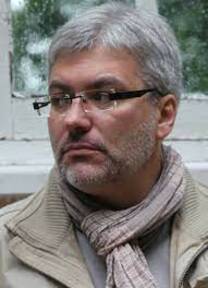On utopia - Gary Saul Morson in NYRB:
‘Having won the Solzhenitsyn Prize, the Big Book prize, and the Yasnaya Polyana Literary Award, as well as having been short-listed for the National Bestseller Prize and the Russian Booker Prize, Eugene Vodolazkin has emerged in the eyes of many as the most important living Russian writer. A literary scholar as well as a novelist—or, as he puts it, an ichthyologist as well as a fish—Vodolazkin draws heavily on the Russian classics in novels of ideas addressing what Russians call “the accursed questions,” including the meaning of life and, especially, the significance of death.
“You Russians really love talking about death,” remarks a character in Vodolazkin’s masterpiece, Laurus, first published in 2012; Russians presume, in the words of a character in his most recently translated work, Brisbane, that life itself “is the long habituation to death.” The same sentiment, of course, dominates the great nineteenth-century Russian novels, especially Tolstoy’s. Gleb Yanovsky, the protagonist of Brisbane, favors Dostoevsky and wonders, as Dostoevsky did, how consciousness can be trapped in mortal flesh. Even when Vodolazkin’s heroes and heroines cite Western writers, they focus, Russian-style, on passages that fearlessly address life’s fundamental mysteries.’
(…)
‘As Solzhenitsyn has suggested, Russians will have progressed morally when instead of dwelling on what others did to them, they examine what they have done. That is the spiritual progress Innokenty makes.
Brisbane, which was published in Russian in 2018, begins in 2012, when Gleb Yanovsky, a world-famous guitarist, discovers a tremor in his hand that interferes with his performance. At just this point, a biographer named Nestorov offers to write Gleb’s life story and prompts his recollections. Again, two stories run parallel. One traces Gleb’s life since 2012, while the other concerns his childhood and young adulthood. Some entries appear in the third person, presumably because Nestorov retells them in his own words, while others are recorded in the first person; in addition to two distinct stories, we have two points of view on the same events. As in Solovyov and Larionov, events, for no discernible cause, echo each other, as if some higher power is offering hints of mysteries governing the universe. In one entry, the boy Gleb discovers his mortality; in the next, the adult Gleb learns that the tremor results from Parkinson’s disease, from which he will die. But then, Vodolazkin always seems to be wondering, isn’t all life a gradual habituation to death?’
(…)
‘Soviet communism represents only an extreme form of utopianism, but utopian thinking also abides in other forms of Western thought. For Vodolazkin, utopianism characterizes “the modern mind,” which misunderstands the relation of human life to time and history. Because utopian thinking places the highest value on the remote future, Bakhtin explained, the near future of the present moment “is drained and bled of its substance.” What’s more, the myth of inevitable progress, Vodolazkin writes in his essay “At Lenin’s Tomb,” substitutes the calendar for real thinking: “History, to the modern mind, has a goal and follows the path of progress, so that new becomes identified with better.” That is why some people refute ideas by saying they belong to the past, as if anything people think now must be superior to anything anyone thought before. We must change our understanding of time, Vodolazkin believes, and that is what his novels try to accomplish.’
(…)
‘Novels, of course, explain the world by stories in which earlier incidents and choices account for later ones. The central narrative trick of Laurus, then, is to present readers with a novelistic narrative while teaching them to overcome the novelistic understanding of events.
Like the hero of Brisbane, Arseny grows up with magic hands: “These were the hands of a musician who had inherited the most astonishing of instruments as a gift: the human body.” The novel opens as the boy Arseny is living with his grandfather Christofer, an expert in curative herbs. Herbalists then explained healing power not with biochemistry but with symbolic correlations between the shape or taste of leaves and their supposed properties. When Arseny becomes a healer who can sometimes even save people from plague, he grows skeptical of herbalism. Avoiding what we would call confirmation bias, he subjected the herbs “to testing and reach[ed] his own opinions.” But this skepticism, interestingly enough, leads to conclusions very different from ours. Arseny’s ability to cure people, he decides, lies in his touch. (And indeed he comes to be called “Rukinets,” not only because he comes from “the Rukina Quarter” but also after the Russian word ruka, hand.) While we might explain this power psychosomatically—today’s disguise for magic?—he believes it reflects divine intervention. He attributes his failures, therefore, to his own sinfulness, and blames himself for his patients’ deaths.’
(…)
‘We can look forward to what Vodolazkin calls a new “concentration,” which will entail “inner strengthening and social reconsolidation.” By focusing on their unique souls, people will try, and occasionally succeed, in overcoming their focus on mere self. Vodolazkin is struck by a phrase that recently entered Russia from the individualistic West: “That’s your problem.” It reflects a worldview that is entirely amoral because it acknowledges nothing beyond self-interest. In Vodolazkin’s novels, by contrast, the deepest moments of self-understanding occur when an empathic hero enters into the souls of others. Arseny’s healing power derives in part from his special ability to listen attentively to others, who feel they are truly understood as if from within. Instead of speaking, he is silent, so their voice becomes his: “They think his attention is special, for he who refuses to speak expresses himself by hearing.”’
Read the review here.
Don’t underestimate the present and the nearby future. Don’t be truly utopian, because you will be ready to slaughter millions for a paradise in a few decades.
Isn’t truly listening to the other (shouldn’t Levinas be mentioned here?) as an act of healing utopian as well?
The gospel of self-forgetfulness will always attract new prophets.
